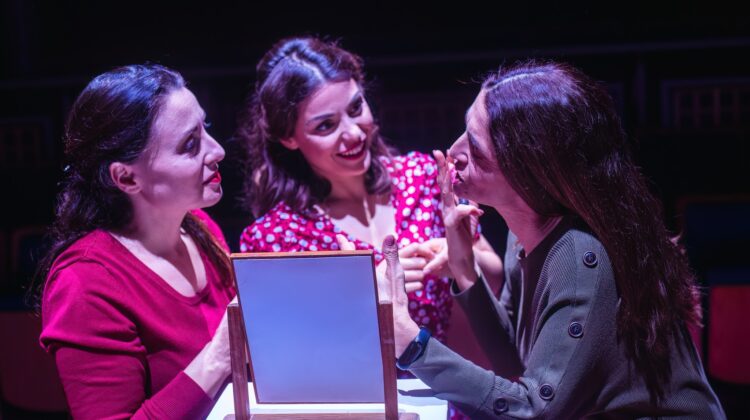
Women’s Day may be a gimmick, but it does serve as springboard to some genuinely useful initiatives. The production of Her Say, Not Hearsay, which opened at Spazju Kreattiv yesterday, is one such example. Directed by Charlotte Grech, who also performs, the play presents three original monologues related to women’s issues – the lack of female rights during wartime, menopause and domestic violence.
The production opens with Kim Dalli’s script, focusing on the situation in 1945, where scores of young working women were being made redundant simply so that men could claim their jobs. Dalli’s narrative imagines a young woman (Naomi Said), who decides to rebel against the status quo, taking inspiration from the suffragette movement to clap back at church and government.
Said does a good job portraying a mix of righteous indignation and naïveté, her rousing monologue heartbreakingly pointing towards both hope and desperation. The script cleverly introduces real-life Maltese feminist figures like Mabel Strickland, elevating this from a mere ‘story’ into a horrifying reminder that in this not-too-distant past women didn’t even have an undisputed right to work, let alone vote.
Wartime letters reproduced from The Times were even more horrifying for the simple reason that I remember similar anti-feminist sentiments being sent to the letters section of the same newspaper within the past decade. Clearly, not enough has changed.
The second story brought forth Lara Calleja‘s vision of a woman dealing with the onset of menopause, humorously and poignantly portrayed by Charlotte Grech. Grech shines in bringing Calleja’s script to life, brilliantly presenting a woman who just can’t deal with all the crap that’s suddenly hitting her body from all directions. She’s self-deprecating, angry, confused and ever so human, seeing the funny side of even the most annoying circumstances, the audience laughing along in empathy.
I didn’t have time to stay on for the post-theatre discussion, but a few quick words exchanged with male members of the audience surprised me by the level of engagement with a topic that is often viewed as strictly for women. Here’s to more playwrights putting the spotlight on menopause as something that affects us all.
I particularly appreciated Calleja’s reference to women being wrongly prescribed anti-depression pills to alleviate menopause symptoms. The topic was dominating UK news recently and, with Calleja’s script being based on a series of real-life interviews she conducted, it is very worrying that a similar trend seems to be emerging in Malta.
The final story was the sobering Sittax, written by Simone Spiteri and performed by Angele Galea, who brings an incredible amount of pathos to the role. Sittax (16) are the number of minutes the protagonist gets to spend everyday free of her husband while he visits his mother. The explanation that unfolds is a sickening tale of domestic violence that starts with the husband forbidding Galea’s character from wearing any makeup and escalates into rape and a broken nose.
The subtle evolution from love-bombing to abuser is expertly portrayed by the script. Galea gives a chilling performance, imbuing her character wit and intelligence that really push the point home: this can happen to anyone. Domestic abuse is not limited to ‘a certain type’ of woman.
Both Spiteri and Galea sensitively underline the complicated psychological issues which see many women staying in an abusive situation sometimes for years.
The production ends with a coda that brings together all three protagonists. I felt this was unnecessary, the theme of universality and commonality having already been successfully made within each narrative. The spot-lighting could also do with refining, preferably not pointing directly into the eyes of a section of the audience.
It’s very easy for social commentary in theatre to backfire. As serious as some causes are, audiences also want to be immersed, engaged and entertained. We’ve had instances where important issues tackled by the wrong hands ended up being overly preachy and alienating audiences.
This is certainly not the case with Her Say Not Hearsay. The play achieves the feat of driving home some strong points while also being extremely engaging. We had laugh out moments even during Sittax, which just goes to show that the right playwright and cast appreciate the value of giving to the audience. This is not to say that every production needs to include funny elements. But there’s a lot to be said for valuing humanity over morality pieces.
Her Say Not Hearsay runs only this weekend at Spazju Kreattiv, so get your tickets here. You don’t need to be a militant feminist to appreciate this piece, just being human is enough.

Leave a Reply